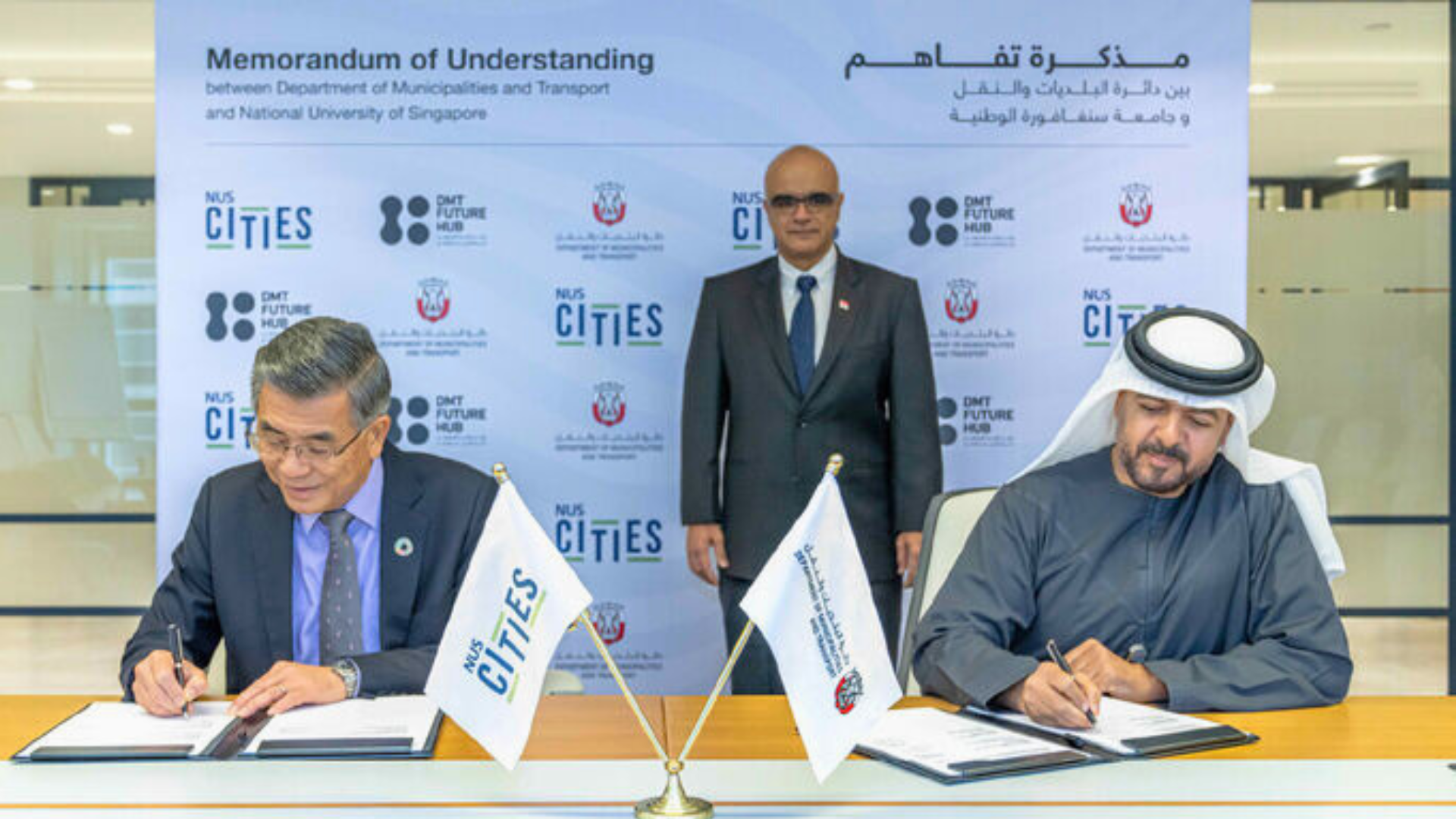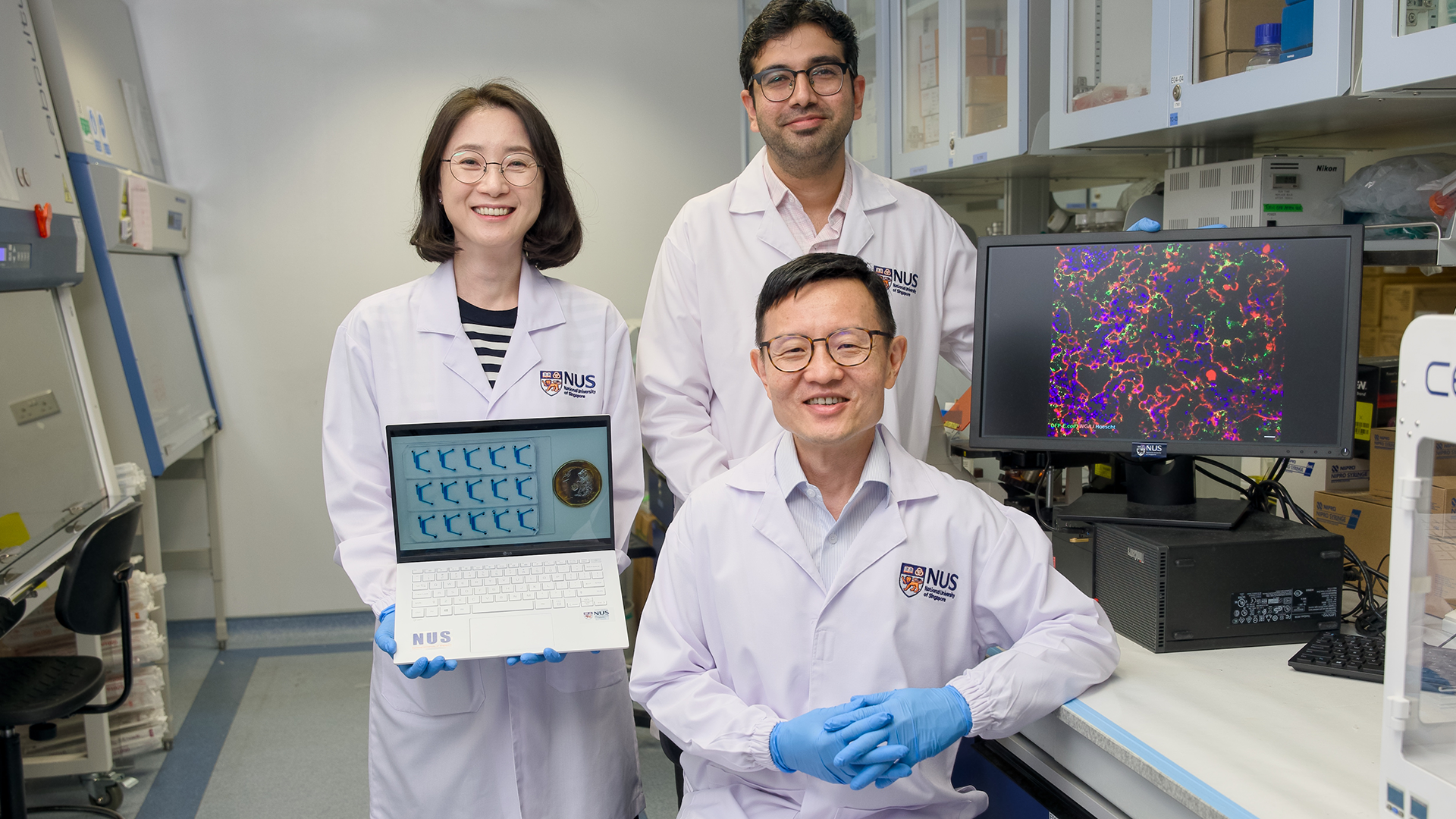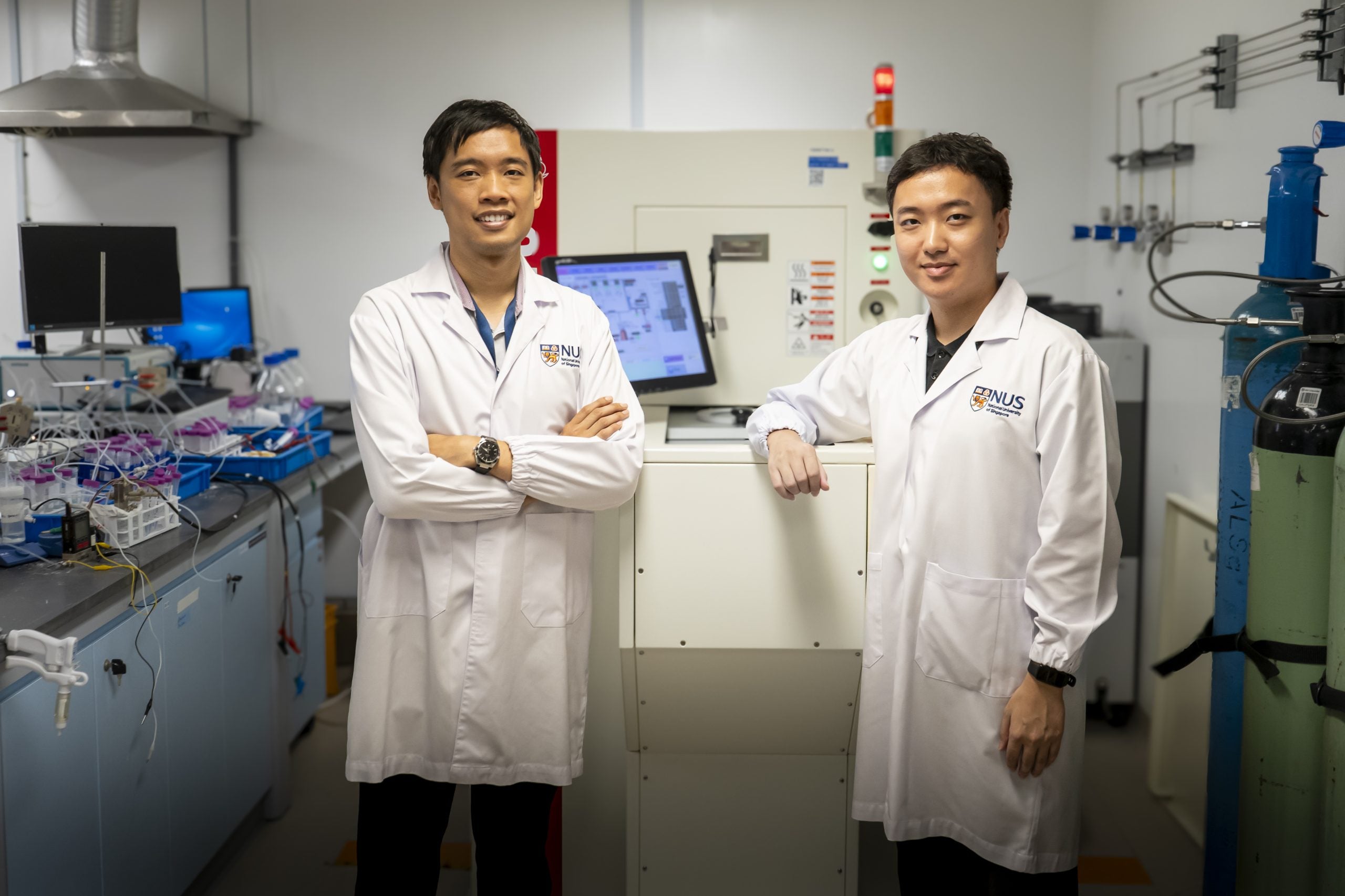RESEARCH IMPACT & COLLABORATIONS
NUS Cities and Abu Dhabi's Department of Municipalities and Transport team up to foster urban growth

“Our work with NUS Cities underscores Abu Dhabi’s unwavering commitment to excellence in urban growth. By joining forces with one of the world’s leading institutions, we are not only bringing groundbreaking expertise to Abu Dhabi but also accelerating our progress towards becoming a global model for innovative, livable cities," said His Excellency Fady El Borno, Executive Director of Strategic Affairs at the Department of Municipalities and Transport (DMT) in Abu Dhabi.
NUS Cities has partnered with DMT as part of its Future Hub initiative, which is dedicated to fostering urban growth and enhancing livability in Abu Dhabi. More than just a collaboration, the partnership will focus on climate-resilient design, advancing livability research, and developing smart mobility solutions through data-driven governance.
“NUS Cities@CDE is honoured and privileged to partner with the Department of Municipalities and Transport, Abu Dhabi, to drive our shared vision of creating a livable, sustainable, and resilient future for our people,” said Professor Lam Khee Poh, Provost’s Chair Professor of Architecture and the Built Environment and Director of NUS Cities Advisory. "We will adopt a holistic framework that is people-centric to develop multi-scale integrated solutions derived from ground-truth data input to deliver measurable performance output to meet the economic and well-being aspirations of individuals and the community at large."
An interdisciplinary entity, NUS Cities is an open and inclusive platform for education, research, and advisory services. Tapping into their core team of experts and knowledge in sustainable infrastructure, advanced data analytics, and green technology integration, the team aims to refine innovative urban environments into spaces that foster both growth and sustainability.
‘Gut-on-a-chip’ promises breakthroughs in health research

An innovative ‘gut-on-a-chip’ technology developed at NUS could be a major advance in the study of human gut health, opening new insights into the intricate relationship between gut microbes and a range of diseases.
The device, known as the Gut-Microbiome on a Chip (GMoC), is a 3D microscopic replica of the human intestines condensed into a chip roughly half the size of a Singapore five-cent coin. The research team behind its development says it will enable scientists to closely examine how gut microbes interact with each other and impact gut health, using a realistic in vitro model.
“The GMoC system represents a significant advancement in our ability to investigate the effect of the gut microbial community on gut health and diseases,” said Professor Lim Chwee Teck (Biomedical Engineering and Director of the NUS Institute for Health Innovation and Technology (iHealthtech)), who led the research. “By establishing a physiologically-relevant gut model capable of culturing communities of gut microbes, we can gain deeper insights into the role and complex mechanisms of these micro-organisms in maintaining gut health and preventing disease.”
Published in the journal Advanced Science, the study highlights how the GMoC system offers a scalable, reproducible and efficient method to investigate the roles of gut microbes - a key area of interest for preventive healthcare and pharmaceuticals.
Read more about this breakthrough on CDE News.
Study unlocks new pathway to turn CO2 into clean fuels

Researchers at CDE have uncovered new insights into the hydrogen transfer reactions that transform carbon dioxide into useful fuels and chemicals. The breakthrough discovery by a team led by Asst Prof Lum Yanwei (Chemical and Biomolecular Engineering) – published recently in Nature Chemistry – provides a clearer understanding of how hydrogen atoms combine with carbon during the CO2 conversion process, a key step in creating molecules such as ethanol and ethylene. This could one day make the process much more selective and efficient.
The research focused on two possible ways hydrogen atoms are transferred. Traditionally, scientists often considered the hydrogen to originate mainly through direct transfer from water molecules in the surrounding liquid, a pathway known as 'the Eley-Rideal mechanism'. However, Asst Prof Lum’s team discovered that another route where hydrogen atoms first settle on the surface of a copper catalyst - the ‘Langmuir-Hinshelwood mechanism’ - plays a far bigger role than previously expected.
Read more about this here.
First Robotics Seed Grant Call
Congratulations to the faculty members awarded funds under CDE’s first Robotics Seed Grant Call.
The NUS Grand Challenge on Robotics Science and Engineering was launched in February 2024 to invite concept papers presenting innovative research ideas in this field. Through a series of workshops conducted within the NUS community discussing these ideas and exploring synergies, emerging research ideas were mapped into five broad areas: healthcare, personalised medicine, workforce automation, personal assistance and sustainable robotics. A Seed Grant Programme in Robotics was subsequently launched to support collaborative projects.
Teams consisting of at least three principal investigators will focus on multidisciplinary projects. The Advanced Robotics Centre (ARC) will support these teams by providing dedicated space and resources to facilitate collaboration under one roof. The second Robotics Seed Grant Call is scheduled for the second half of 2025.
| Principal Investigator | Department | Project Title |
| CDE | ||
| Assoc Prof Yu Haoyong | Biomedical Engineering | An intention-adaptive knee exoskeleton system for stair climbing assistance |
| Asst Prof Liu Dianbo | Biomedical Engineering | Simulating human-robot workforce dynamics in manufacture industry and health using Machine Learning |
| Asst Prof Liu Yuxin | Biomedical Engineering | Engineering living electronics for electrogenetic sensing and robotic control |
| Assoc Prof Vincent Lee | Electrical and Computer Engineering | A multimodal sensing/haptic system for lower-limb exoskeleton feedback control |
| Assoc Prof Vincent Lee | Electrical and Computer Engineering | Ai-sensor enhanced medical operation training system |
| Assoc Prof Chui Chee Kong | Mechanical Engineering | Integrated simulator development for active, data-driven robotic surgery training |
| Asst Prof Tan Yu Jun | Mechanical Engineering | Biodegradable biohybrid robot with skeletal muscle-based actuators |
| Asst Prof Zhu Lailai | Mechanical Engineering | Modelling and predicting the mechanics and hydrodynamics of artificial robotic swimmers |
| Other Schools/Faculties | ||
| Principal Investigator | School/Faculty | Project Title |
| Asst Prof Song Ran | Faculty of Arts and Social Sciences | Robot exposure, labour demand for immigrant workers and government immigration policies |
| Asst Prof Lu Yao | School of Computing | Compute and data platforms in AI-for-economics study |
| Asst Prof Shao Lin | School of Computing | Learning a generalisable embodiment-aware robotic policy for exoskeletons |
| Asst Prof Joseph Ng | School of Medicine | Dynamic modelling of student-teacher interaction for improved robotic surgery training |
Major Grants Awarded
The major grants (start date in February 2025) with total project value > $1M.
| Hosting Unit | Project Title | Funding Programme (Source of Funding) |
Principal Investigator | Co-Investigator |
| ECE | Detection and manipulation of sub-THz magnetic resonance | ACRF tier 2 grant - 2024
(MOE) |
Yang Hyunsoo | Mansoor Bin Abdul Jalil |
| BME | Development of sustainable biomanufacturing technology platform (SBTP) for eco-friendly biobased compounds | Industry alignment fund - industry collaboration projects (IAF-ICP) – 2024
(A*STAR) |
Poh Chueh Loo |


